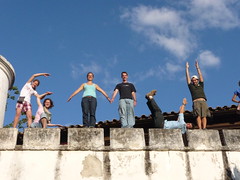 Our visit to ASONOG in Santa Rosa de Copan was very fascinating. I thought that it was very cool that we could make that connection from our speaker in the first week of orientation, Francisco Machado, to the organization that he worked with in Honduras and actually see the work they’re doing that is so dangerous to some people’s interests that he had to flee to the United States. I was appalled to hear of the pollution being produced by the mining companies, especially the cyanide pollution. Cyanide is an extremely deadly poison that they use to extract gold from the rock they mine. After the process is over they either leave the soil, but the cyanide makes is unusable, or they dump it into rivers that serve as water sources for nearby communities. It kind of upsets me. Aren’t there safer ways to extract gold than exposing so many people to such a poisonous substance? Have they no regard for human life at all? I was very glad to hear about the Civic Alliance for Democracy, a civilian organization researching the effects of cyanide on the local health and organizing local communities in protests. The Catholic Church has also gotten involved in ensuring the welfare of its people.
Our visit to ASONOG in Santa Rosa de Copan was very fascinating. I thought that it was very cool that we could make that connection from our speaker in the first week of orientation, Francisco Machado, to the organization that he worked with in Honduras and actually see the work they’re doing that is so dangerous to some people’s interests that he had to flee to the United States. I was appalled to hear of the pollution being produced by the mining companies, especially the cyanide pollution. Cyanide is an extremely deadly poison that they use to extract gold from the rock they mine. After the process is over they either leave the soil, but the cyanide makes is unusable, or they dump it into rivers that serve as water sources for nearby communities. It kind of upsets me. Aren’t there safer ways to extract gold than exposing so many people to such a poisonous substance? Have they no regard for human life at all? I was very glad to hear about the Civic Alliance for Democracy, a civilian organization researching the effects of cyanide on the local health and organizing local communities in protests. The Catholic Church has also gotten involved in ensuring the welfare of its people.
The original mining law that allowed mining companies to evict people from their homes (the new law isn’t much better) reminded me of how in the States, the road building companies used to be able to forcefully take over people’s land to build roads and expand the infrastructure. I’m not really sure how much that goes on anymore, but I’m sure whatever does happen is much different from the new mining law in which there is so much pressure to sell that you’re almost basically forced to.
Along with their work in mining, ASONOG is doing some work with community development, such as risk management and capacity building, which I was very impressed with. They even have regional boards, and they have national conferences to discuss current issues regularly. I was thinking a bit about how these municipalities only receive around 1% profit from the industry that is destroying their land and the health of the people, and it reminded me of discussions we’ve had in class about this idea of center and peripheral countries. The peripheral countries produce raw materials like food and metals, and these are sold to the center countries at a pretty cheap price. These are then processed into refined goods, and sold back to the peripheral countries for a profit. Because the peripheral countries do not provide their own refined goods, and what they can produce is of less monetary value, this creates a great inequality in the wealth of nations. Yes, it’s wonderful that Honduras can produce this raw precious metal, but when it is only sold, or extracted by the center countries, the peripheral countries are taken advantage of, and this is a prime example. The municipalities receive 1% of the profit from the industry that is polluting their soil and drinking water, displacing hundreds of people from their homes, and stripping their land of the natural resources that belong to the people. The Honduran needs to seriously reconsider the concessions it gives to these mining companies. One has to wonder if these communities would actually make more money extracting, working, and selling the gold themselves as artisans.
-Ingrid Johnson